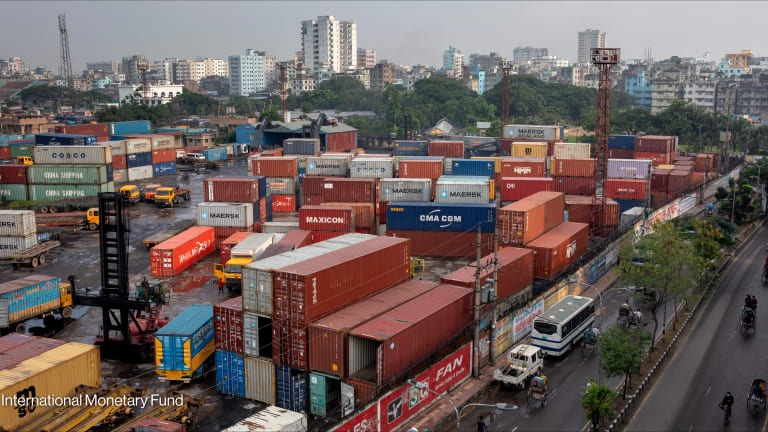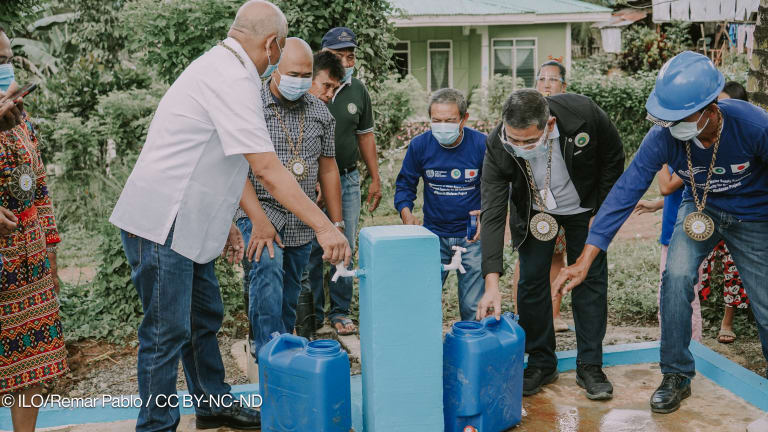Get to know these 4 Latin American aid donors
Devex takes a closer look at the development aid agencies of Chile, Costa Rica, Colombia, and Mexico — OECD member countries from LAC — and their development aid spending, priorities, and key programs.
The Organisation for Economic Co-operation and Development’s regional program for Latin America and the Caribbean commemorated its fifth anniversary this year. Members of OECD from LAC are Chile, Costa Rica, Colombia, and Mexico — while Argentina, Brazil, and Peru are prospective members. These countries are recipients of official development assistance — with Mexico receiving $525 million and Costa Rica $55.8 million in 2019, while Chile received its last ODA funding in 2017, worth $70 million — as well as aid providers for South-South and triangular cooperation, joined and co-funded by other OECD donors and multilaterals. In 2019, disbursements of ODA in the region from public and private sources stood at $8.8 billion with close cooperation from leading regional partners such as the Caribbean Development Bank, Inter-American Development Bank, Development Bank of Latin America, the European Union, and the World Bank. Devex took a closer look at the development aid agencies of OECD member countries from LAC, their development aid spending, priorities, and key programs. Mexico Year of accession to the OECD: 1994 Development aid agency: Mexican Agency for International Development Cooperation, or AMEXCID Executive Director of AMEXCID: Laura Elena Carrillo Cubillas Total estimated development cooperation in 2019: $72.8 million Mexico was the first member of OECD from LAC, ranking ahead of other ODA providers from the region, with an estimated contribution of $72.8 million to multilaterals in 2019 — up by 26.3% compared to 2018. Its development aid has expanded from technical assistance to providing scholarships, humanitarian support, and financial assistance through its international development cooperation agency AMEXCID and its foreign ministry, including a €6.5 million ($7.54 million) project on vocational education and training systems in partnership with Deutsche Gesellschaft für Internationale Zusammenarbeit, or GIZ. Recently, Mexico advocated for the new Comprehensive Development Plan — a program that will address the problem of migration from El Salvador, Guatemala, and Honduras by promoting sustainable agriculture and supporting the youth in entering the formal labor market. Mexico vowed to commit $77 million to this program to achieve its development goals. Chile Year of accession to OECD: May 2010 Development aid agency: Chilean Agency for International Cooperation and Development, or AGCID Executive Director of the AGCID: Cristián Jara Brito Total estimated development cooperation in 2019: $31 million The country graduated from ODA reliance and moved toward high-income status in 2011, a year after it became a member of OECD. Chile was removed from the list of ODA recipients in January 2018. It has been increasing its presence as a development cooperation partner through AGCID, by managing bilateral funds such as the Chile Fund; Chile-Mexico Joint Cooperation Fund; Chile-Japan alliance, or the KIZUNA program; Chile-Spain Fund, among others. Chile’s priority partner countries are primarily in LAC. Its programs focus on governance and strengthening institutions; poverty reduction and social development; and supporting industry, innovation, and competitiveness. Chile’s development cooperation fund was $31 million in 2019, of which around $24 million went to the United Nations, while a little over $7 million was AGCID’s budget for bilateral cooperation. Chile recorded almost 150 cooperation projects, 124 of which were bilateral. According to AGCID’s 2019 annual report, $6.5 million were managed by the agency and eight projects were funded by multilateral donors. Colombia Year of accession to OECD: April 2020 Development aid agency: International Cooperation Directorate in the Ministry of Foreign Affairs, and the Presidential Agency for International Cooperation, or APC-Colombia Director General of APC-Colombia: Viviana Manrique Zuluaga Total estimated development cooperation in 2019: $45 million Colombia is the 37th member of the OECD. It boasts the second highest development contribution among LAC countries in 2019, worth $45 million. Its multilateral contributions, mostly channeled through the U.N., decreased by 71% between 2018 and 2019 — from $47.5 million to $14.1 million. APC-Colombia manages the country’s development cooperation, which focuses on social development, climate change, and disaster risk management across 74 countries in LAC, Africa, Asia, and the Middle East. In terms of its COVID-19 response, Colombia provided $73,000 to the International Assistance and Cooperation Fund to enhance the capacity of hospitals in other LAC countries. Costa Rica Year of accession to the OECD: 2021 Development aid agency: Ministerio de Planificación y Política Económica, or MIDEPLAN, and the Ministry of Foreign Affairs Minister of MIDEPLAN: Maria del Pilar Garrido Gonzalo Total estimated development cooperation in 2019: $6.2 million Costa Rica is both a provider and recipient of development aid, spending $6.2 million for in-kind cooperation in 2019 — almost $2 million more than the previous year. Its contribution to multilaterals also increased by 46% — from $2.14 million in 2018 to $4 million in 2019. It mainly provided technical assistance to Latin American countries for programs funded by other OECD donors, such as Spain — through its fund for triangular cooperation in Central American and Caribbean countries — and Germany — through the Regional Funds for Triangular Cooperation in Latin America and the Caribbean. For its COVID-19 response, the country extended technical assistance to Argentina, the Dominican Republic, Ecuador, and El Salvador. Aside from supporting COVAX, Costa Rica also proposed the creation of the Fund to Alleviate COVID-19 Economics — an initiative that aims to provide financing to economies hit by the pandemic using contributions from high-income countries. Since the start of the pandemic, the country has been proposing solutions to the pandemic through access to technologies and knowledge-sharing. Try out Devex Pro Funding today with a free 5-day trial, and explore funding opportunities from over 850+ sources in addition to our analysis and news content.
The Organisation for Economic Co-operation and Development’s regional program for Latin America and the Caribbean commemorated its fifth anniversary this year. Members of OECD from LAC are Chile, Costa Rica, Colombia, and Mexico — while Argentina, Brazil, and Peru are prospective members.
These countries are recipients of official development assistance — with Mexico receiving $525 million and Costa Rica $55.8 million in 2019, while Chile received its last ODA funding in 2017, worth $70 million — as well as aid providers for South-South and triangular cooperation, joined and co-funded by other OECD donors and multilaterals.
In 2019, disbursements of ODA in the region from public and private sources stood at $8.8 billion with close cooperation from leading regional partners such as the Caribbean Development Bank, Inter-American Development Bank, Development Bank of Latin America, the European Union, and the World Bank.
This story is forDevex Promembers
Unlock this story now with a 15-day free trial of Devex Pro.
With a Devex Pro subscription you'll get access to deeper analysis and exclusive insights from our reporters and analysts.
Start my free trialRequest a group subscription Printing articles to share with others is a breach of our terms and conditions and copyright policy. Please use the sharing options on the left side of the article. Devex Pro members may share up to 10 articles per month using the Pro share tool ( ).
Janadale Leene Coralde works as a contributing analyst for Devex. Based in Manila she reports on development donors activities and designs funding data visualisations. She has a degree in political economy, specializing in international relations and development, and has previously worked as a researcher for Chemonics, the REID foundation, and the Philippines House of Representatives.
Miguel Tamonan is a Senior Development Analyst at Devex, where he analyzes data from public and private donors to produce content and special reports for Pro and Pro Funding readers. He has a bachelor’s degree in Political Science with a Major in International Relations from the Polytechnic University of the Philippines.









